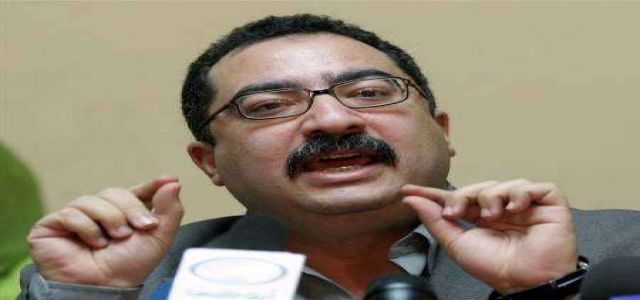|
|||||||||
| :: Issues > Human Rights | |||||||||

Silencing the editors
Ibrahim Eissa, editor of Egyptian opposition newspaper al-Dustour, was due in court on 1 October for "defaming" President Hosni Mubarak. Eissa regularly talked of Mubarak’s failing health in his columns, and even ran such stories on al-Dustour’s front page.
|
|||||||||
| Thursday, October 4,2007 08:17 | |||||||||
|
|||||||||
|
Observations on Egypt Ibrahim Eissa, editor of Egyptian opposition newspaper al-Dustour, was due in court on 1 October for "defaming" President Hosni Mubarak. Eissa regularly talked of Mubarak"s failing health in his columns, and even ran such stories on al-Dustour"s front page. Eissa"s trial was postponed, which typifies Egypt"s stop-start press freedoms. As the most confrontational of the country"s editors, Eissa, too, has become a symbol of the struggle for press freedom in Egypt. Until a few years ago all Egyptian papers were state-owned, after Nasser nationalised the press in the early 1960s. In recent years, the government has relaxed restrictions, giving rise to the emergence of hundreds of new independent publications. The government may arbitrarily arrest opposition politicians and break up peaceful protests, but for the most part it has allowed the press to report this openly. The first warning shots were fired in January this year when al-Jazeera producer Howayda Taha was charged with "harming Egypt"s national interest" while researching a documentary on torture in Egypt"s prisons. Taha was ordered to pay a fine of $5,200 or face six months imprisonment. The arrests of Eissa and four other editors - also charged with defaming the president - lead many to worry that a brief period of press freedom is disappearing. Some analysts believe the regime became nervous about speculation in the press that Mubarak"s son Gamal was being groomed for the presidency. Another theory is that the US eased its pressure on Egypt to democratise. Lawrence Pintak, head of the Centre for Electronic Journalism at the American University in Cairo, says before Egypt"s 2005 elections, the US pushed for democracy to try to improve its image in the Middle East. "Democracy became flavour of the month," said Pintak. "But after the [electoral] success of the Muslim Brotherhood, and then Hamas in Gaza, talk of democracy dropped off." Eissa interprets the crackdown on the press as a sign of weakness. "The regime is panicking," he said in an interview recently. " [They] see anyone that writes the truth about them as dangerous." Magdi El-Gallad, editor-in-chief of a leading broadsheet, Al-Masri Al-Youm, admits to being "very worried" about the direction Egypt"s press is headed, especially given how far it had come. "We fought so much over the past five years for press freedom," he said. "We are in a critical situation right now and we cannot predict what will happen. There could be very tough times ahead." As we go to press, Egypt"s independent and opposition newspapers were planning not to publish editions on 7 October in protest. |
|||||||||
|
Posted in Human Rights |
|||||||||
|
|||||||||
|
|
|||||||||
| Related Articles | |||||||||
|
|






